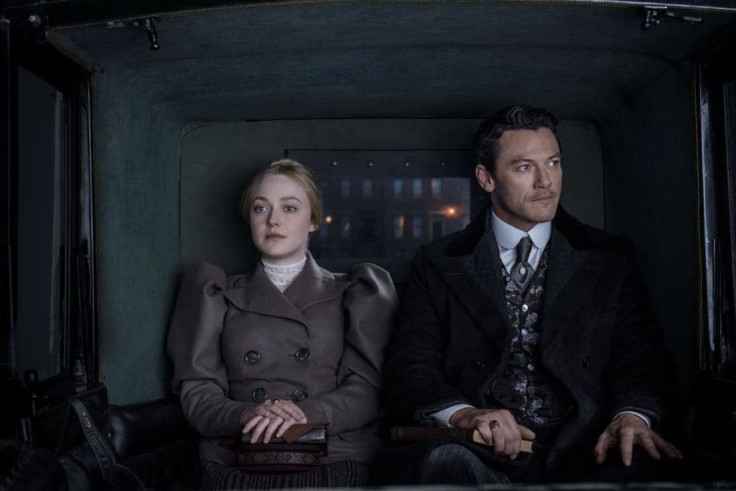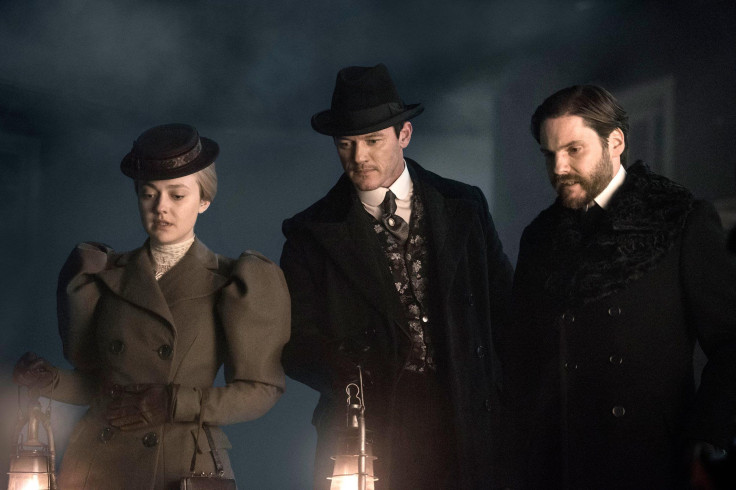The third episode of The Alienist, “Silver Smile,” opens in the dining room of a rich man, tended by servants and the former chief of police, who describes the ongoing serial killer investigation with his hat in hand and eyes downturned. The plutocrat’s bought cop worries the murders may have something to do with the scion’s son, Willem. If that’s the case, Willem is a very well-connected serial killer. As in the second episode, “A Fruitful Partnership,” The Alienist chases its criminal case through every layer of the class structure. But whereas previous episodes roved around the show’s elaborate reconstruction of 1890s New York, “Silver Smile” is the first to spend the majority of its time with the alienist and his team of investigators as they search for insights beyond forensic fact.
Central to Dr. Laszlo Kreizler’s (Daniel Brühl) psychological theories is that serial murder can be analogized to the coping mechanisms and personality-bound pursuits of normal people. “We all in some manner protect ourselves from psychological and emotional pain, by taking action to craft fantasies of revenge, of power, of sexual gratification,” Dr. Kreizler asks, “What is your opiate?”
Like the Netflix series Mindhunter, The Alienist explores a once-controversial idea that is now almost banal: evil acts are the product of explicable psychological processes. The serial killer doesn’t kill because he’s evil or for reasons that are ultimately imponderable, but for reasons that can be understood. Since that’s the operating assumption most viewers have about crime — demonic possession just doesn’t cut it anymore — The Alienist must find ways to make that exploration exciting and fresh (imo, Mindhunter failed in this respect). “Silver Smile” is half-successful.
The episode’s first narrative task is endearing us to its cast, so that their psychological insights reflect back upon characters we care about. “Silver Smile” accomplishes this by spending time with the central characters when they’re not working on the case. John Moore (Luke Evans) faces down his parents about his drinking and daydreams through an awkward courting visit. Sara Howard (Dakota Fanning) attends a Vassar reunion and lies to her married friends about having a beau (she claims to be dating a doctor, presumably with Laszlo in mind). Kreizler’s opiate is more ambiguous: a simmering sexual tension with his housekeeper, Mary Palmer (Q’orianka Kilcher), revealed to be a reformed murderer herself. Each finds their life incomplete somehow, each is urged to explore their dissatisfactions for insight into the predator killing boys all over New York.
Their self-examination is interrupted by another victim, this one left gutted atop an under-construction aquarium. Commissioner Teddy Roosevelt — seemingly the only good cop in New York outside of Howard and the forensic expert Isaacson brothers — gives them a brief window with the body before police loyal to their former chief show up and sabotage the crime scene. The actual investigation is as moody and disgusting as serial killer addicts could want, including some truly repulsive close-up gore. What doesn’t work is the narrative pressure applied when the press shows up, since the only thing at stake is Roosevelt’s good standing. Vague reputational damage doesn’t make for an exciting escape.
Returning to Kreizler’s library after staying awake all night at the crime scene, The Alienist ends with a blunt explication of themes it handled more subtly in previous episodes. Kreizler, keyed up and hoping to find further insight into the killer’s psychology, drills Moore and Howard on their personal traumas. “Ms. Howard, how did you cope with your father’s suicide?” Kreizler asks, to open the brainstorming session. Any fan of Star Trek would recognize the ensuing argument. Dr. Kreizler is logical and insensitive, like Spock, while Moore becomes “Bones” McCoy: self-righteous, indignant and unwilling to probe “improper” possibilities. With Howard dumbstruck, the moment becomes shouted scenery-chewing between two equally silly men, one unable to muster the barest pretense of normal conversation, the other so aghast — “I dare say, sir!” “I’m shocked, sir! Shocked!” — that the episode-long layering of subtexts is shattered.
Bound to the criminology of its era, The Alienist must instead find its psychological complexity in the interplay between its characters. But while each character is compelling individually, this third episode of the series doesn’t yet cohere them into anything more than a Monster Squad-esque Mystery Club. There are frequent flashes of life between them, especially Moore’s mistimed kiss — a moment of perfect and explicable awkwardness, male ego and miscommunication — but The Alienist continues to fall just a hair short of its intended weightiness.

The Alienist returns next Monday for episode 4, “These Bloody Thoughts.”
- Beautiful costumes and sets, great atmosphere
- Powerful cast
- Great eye for historical detail
- Works along standard serial killer tropes, at least in its premiere



















